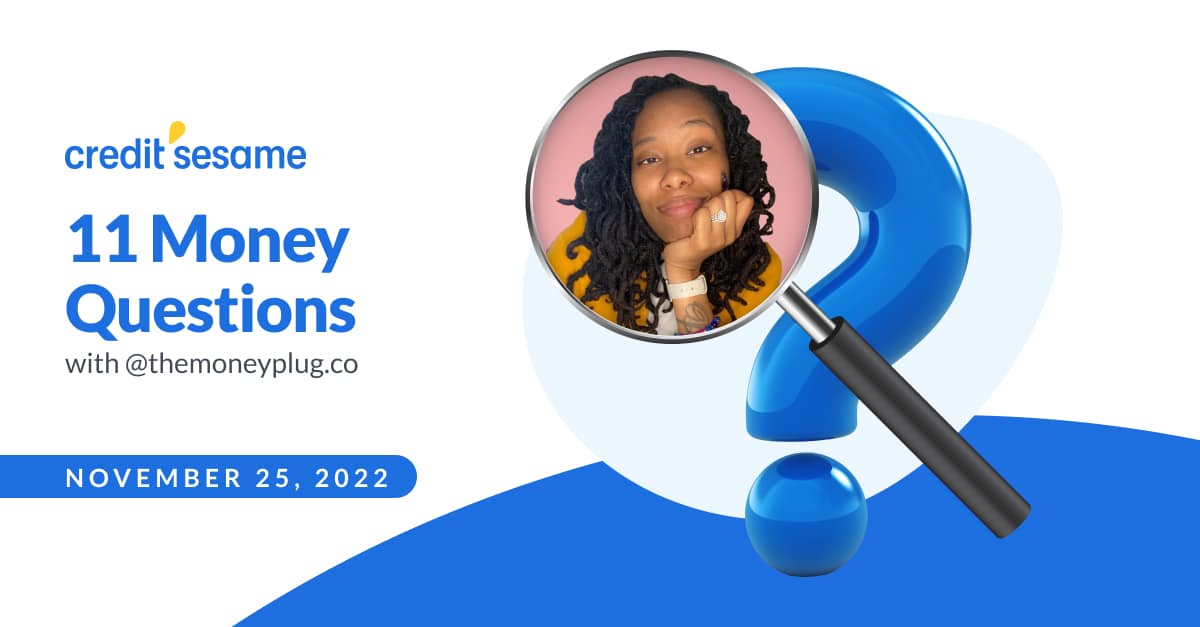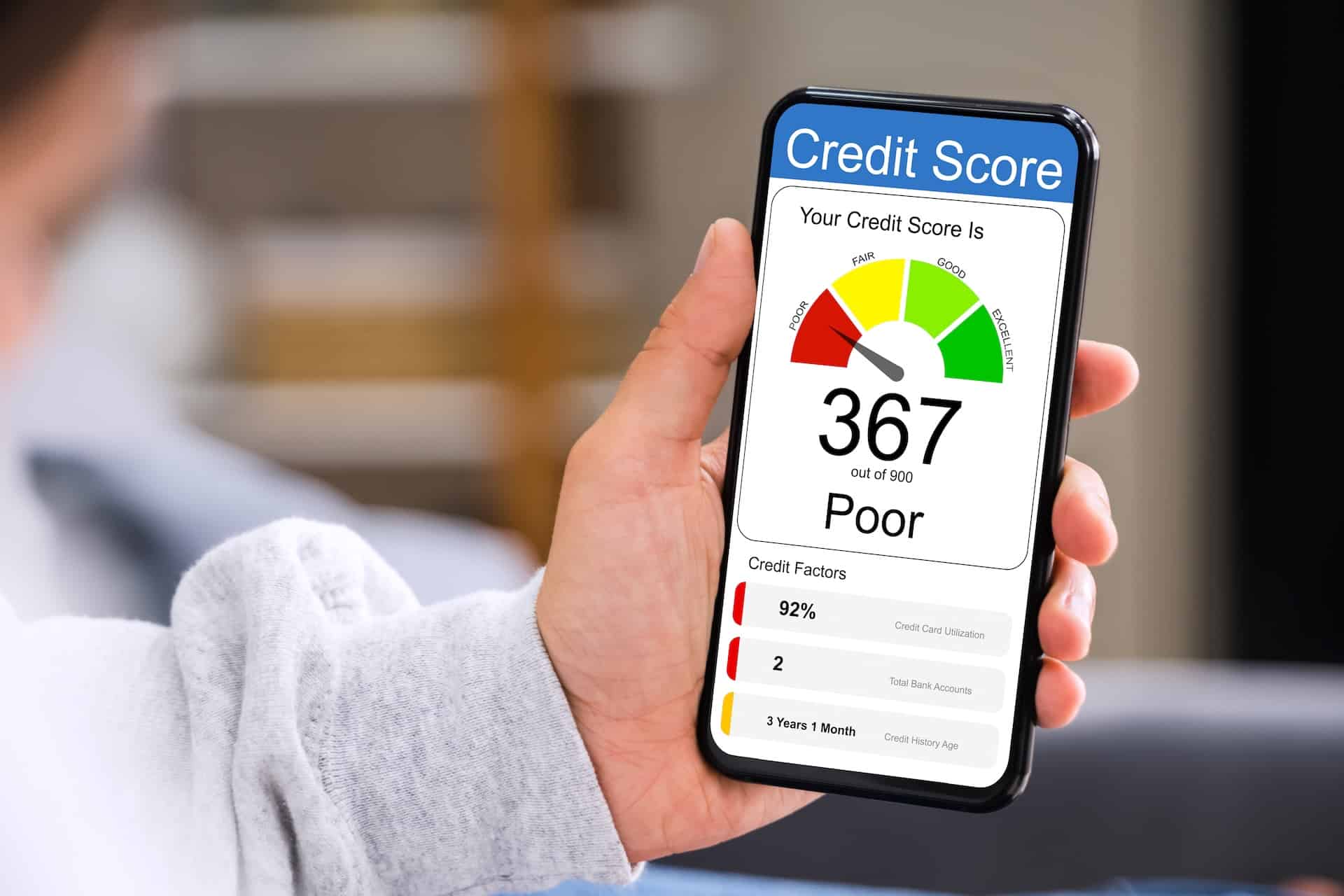Credit Sesame interviewed Markia Brown aka The Money Plug as part of its 11 Money Questions series asking financial coaches personal finance questions most people don’t like to ask.
1. How old are you and what is your yearly income?
When first interviewed by Credit Sesame for a short video, Markia replied:
“I’m 29 years old, and between myself an my husband we bring in about $110,000 – $120,000 a year.”
Since then her financial picture has gotten even better. “This has gone up since the original interview. Now I have a full-time job. I’m a content creator for an ad agency in L.A.”
2. How much is your rent or mortgage?
“We rent and our rent is $1,400 a month.”
The dollar figure may change because Markia and her family are on the verge of moving to Los Angeles. One thing that won’t change any time soon is her view on renting vs. owning.
“For now we’re happy to rent. My financial goals do not involve being a landlord or investing in property. So for me buying a home would have to involve finding my dream home, and that hasn’t happened yet. Until then, we’re comfortable renting.”
One factor that puts buying a home on the back burner for Markia is the recent jump in interest rates. “Higher mortgage rates are most definitely a factor. There’s no way I’m buying a house under current conditions.”
3. What’s the last thing you purchased?
“The last thing I purchased is a Pepsi.”
It’s a simple answer to a simple question, but for Markia even that kind of everyday purchase is part of a bigger strategy.
“I actually have a Pepsi budget because it’s something I buy a lot of. I use the “take five” method to budgeting. It’s similar to the envelope method except it involves using different bank accounts instead of cash, because I don’t like to handle cash. For example, I have two checking accounts – one for household bills and the other’s my lifestyle account for personal things. Also, if I need a little extra to make ends meet, I borrow from the lifestyle account.”
Speaking of lifestyle, a strict budget discipline and having a purpose for every dollar is part of the daily routine in Markia’s household. “To the kids, this is normal. They think everybody does this. We talk about things like revenue and profit and the value of their time. I try to demonstrate to them the importance of money, but not necessarily as the thing that has to motivate you.”
Passing her financial knowledge along to her kids is important to Markia because that knowledge it was hard-earned.
“I’m a survivor of domestic violence. When I left that situation, I didn’t know what I know now about finances. So I took classes, read books and took more classes. The experience made me want to know as much as possible so I could take care of myself.”
Markia is sharing her financial savvy beyond her own family. On her website, MarkiaBrown.com, she refers to herself as “The Money Plug.” That means she wants to be viewed as a go-to source for practical information on household finances.
To pursue this mission, Markia has become a Certified Financial Education Instructor. In addition to her website, Markia uses TikTok to reach over 200,000 followers.
The budgeting discipline Markia follows in her personal life is a big part of her financial message for her audience. She finds that failure to budget is the most common mistake that consumers make.
“So many people think they know how much money they’re spending but if you actually wrote it all down they’d be way off.”
In many cases, Markia finds that some budgeting tips can be enough to set people on the right path. “Most of the people who come to me for advice do not have a budget. By the point they ask for help, they’re willing to try anything. So usually they’re motivated to stay on a budget once you teach them how to make one.”
For those who need some ongoing help sticking with a budget, Markia suggests that apps can provide continual reminders.
“For people who don’t have the discipline to stay on a budget by themselves, there are a lot of financial apps that can help people stay on track. One is Qube. I like that because its a neo bank. Based on the budget you set, that’s all you’re allowed to spend. It even limits your spending by category.”
Markia also believes apps can help people expand their general financial knowledge. “From an education standpoint there’s an app called Goalsetter. I use it with my kids as part of their home schooling experience about personal finances. It’s really engaging and relatable. It also offers a debit card you can transition to using to apply the lessons.”
4. What do you spend the most money on?
“I definitely spend the most money on food.”
Markia approaches the challenge of feeding a big family by being precise about her budget. “We have a large family – there’s seven of us, with five children. So we buy in bulk. To do this right I have meal plans based on the portions that everybody eats. That way I can shop every two weeks and know I have enough in the house until the next paycheck.”
This discipline has been especially valuable in a year of high inflation.
“We’ve learned to make do with what we have. We know what we’re likely to make over the course of the year, so we budget. That was definitely key to making sure we stayed above water. We substitute some items for others to keep things in line, so inflation hasn’t really bothered us much except for gas prices.”
5. What kind of car do you drive and how much is your monthly car payment?
“I drive a 2021 Honda Odyssey, and my car payment is $557 a month.”
Naturally, Markia explains her advice about buying a car in terms of budgeting.
“When you’re buying a car, the big thing is you have to establish a budget. You base what you buy and the loan on the payments you can afford. The way I look at this is I have fixed and variable income, and I have to separate those. I budget so I can afford the payments on the fixed income.”
Picking the right loan can be as important as picking the right car. Markia says people should “start by getting prequalified so you know what you’re payments will be. That way you can make sure they fit you’re budget.”
Markia has a five-year loan, which is a little shorter than the average these days. “I thought about the quality of the car when I chose a five-year loan because I want it to have a shelf life longer than the loan.”
Her choice of car loan had an additional purpose: “When I got my car loan I knew that having a long-term loan in my mix of credit would help my credit score. I have a five-year loan, but then after the last payment that loan stays on my record for seven years. And of course I make all my payments on time.”
6. What’s the most expensive thing you own?
“The most expensive thing I own, without a doubt, is my iMac. I’m a techie. I’ve always wanted an iMac, so saving up to buy that was a big goal. Now I know I can meet a big savings goal like that, I can set my eyes on the next goal.”
7. How much do you have in savings?
“I have $5,367 saved.”
Though she has started saving for retirement, Markia regrets not having gotten an earlier start.
“When I was in the military I wish I had known I could have an IRA outside the military retirement plan. Since I got out and figured that out, I’ve been putting money in a Roth IRA. Both my husband and I will have military benefits so we’re not as dependent on our own savings.”
At this point, Markia is taking a conservative approach to investing her retirement nest egg. “My Roth IRA is 25% in bonds but no stocks. I don’t like what the market’s doing this year. Maybe once it levels out I’ll buy into it a little more.”
8. Do you have student loans? If so, how much?
“I do not have student loans Shout out to my GI Bill!”
Though she does not owe student loan debt, she knows plenty of people who do. Her advice for them is “The biggest thing is you have to find a payment strategy that works for you. Even outside of student loans, you have to do this for all your debts. Figure out how you can afford to pay as much as possible. Understand that your situation may change, so you have to reevaluate every month or quarter to quarter to make sure you’re on track to meet your financial goals.”
A recent court ruling has cast doubt over the Biden Administration’s student loan forgiveness program. Markia has advice for dealing with that uncertainty.
“Always hope for the best but plan for the worst. Adjust your budget assuming you’ll have to pay the full amount back. Get your paperwork for income-based payments in now, so it will be ready when payments resume.”
9. Do you have credit cards? If so, how many?
“I do have credit cards. I have five credit cards.”
Markia gives each of her credit cards a different role to play in her finances, depending on their characteristics.
“All my cards have assigned purposes. One gives cash back on groceries, so that’s my food card. One gives gas rewards, so that’s my gas card. I assign each a purpose based on its interest rate and rewards.”
When considering a new credit card, Markia looks at both the card issuer and what the card has to offer.
“I look at the bank. A bank I see myself having a good relationship with. Their reputation for customer service. Also a good rewards program I can qualify for and whether a new card will give me different options.”
Beyond being able to buy things and earn rewards with her credit cards, Markia uses them as a tool for building credit.
“I have three main ones and I’m an authorized user on two others. Those two I’m an authorized user on gave me a credit history on accounts that have been around a long time.”
Age of credit history is a factor in determining credit score. Even more important are payment history and credit utilization.
“I almost always pay my balance off every month unless there’s an extenuating circumstance. I keep my credit utilization under 3%. It’s all about knowing when to pay your credit cards. If you pay your credit card down before the end of the billing cycle it will show a low amount due and this will report your credit utilization as extremely low.”
10. What’s one of your financial goals?
“One of my financial goals is to pay my car off.”
Getting rid of that debt would represent a landmark accomplishment to Markia.
“I’ve never been debt free. Since I’ve been old enough to incur debt I’ve always had debt, so it’s important to finally get over that hill.”
Once that goal has been achieved, Markia will turn her attention to the next goal. “Then I can put the money from the car payments into savings accounts instead. I hope to be able to buy the kids cars when they turn sixteen.”
11. What is your credit score?
“I checked my credit score using the Credit Sesame app and I’m sitting at 710.”
Markia’s experience has taught her the value of having good credit. It not only gives her better financial options, but she sees her credit score as a measure of the progress she’s made.
“When I was first on my own, I kept getting turned down for apartments because of a low credit score. At one point I remember my credit score was 444. To see it grow above 700 is like an ‘I made it’ moment.”
Asked how her credit score made so much progress, Markia replies “The biggest thing for building credit is payment history. That ties back to budgeting. Once I started budgeting, it required me to know when my bills are due and how much I’m going to need. That’s the foundation I’ve been able to build on to get my score into the 700s.”
Finally, thinking back on her financial journey, Markia said she’d offer the following advice to a younger version of herself:
“Slow down. When you get freedom for the first time you feel like you have to do everything. You’re living in the moment, but you need to understand the consequences of the moment can last longer than you think. So think about the consequences of your decisions.”
If you enjoyed the 11 Money Questions answered by The Money Plug, you may be interested in:
Disclaimer: The article and information provided here is for informational purposes only and is not intended as a substitute for professional advice.




















